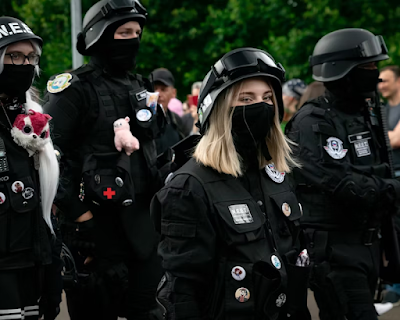Anora Reminds Us That Only Inclusive Diversity can Protect Social Minorities
What do you think of when you hear the word "prostitute"? What about "a Russian bodyguard"? The chance is that the former is imagined as a cunning power player, using sex to get money, information, and whatever resources they need to get out of the dire, impoverished environment that they are in. The latter is the opposite, a mindless brute who follows the orders of the rich boss, bestowing violence upon enemies without a hint of remorse or compassion. Thanks to the mainstream media, particularly the depiction of Hollywood movies, accepting such stereotypes has almost in itself become a social norm.
But every once in a while, something comes along with a genuine effort to break and then see complex, nuanced human beings behind the stereotypes. Anora was such a remarkable attempt. The story of a prostitute and three Russian bodyguards searching for the runaway son of a Russian oligarch that she married and they are supposed to protect gives plenty of time and space to portray these four people not as minor setpieces in a bigger story. Instead, their identities, emotions, and very everyday complaints about the difficulties of everyday life take center stage.The method by which the movie successfully humanizes these often-overlooked characters is a rather simple one. By making them the main protagonists of the movie, it forces the audience to recognize that they are not simply the jobs they do and the situations they are thrown into, but can have complex emotions. In the movie, they show genuine anger, dismay, and frustration at how their lives are upended by the wealthy oligarchs they work for, and their difficulties as immigrants far away from the the kind of social and community support people normally need to survive.
As the movie shows the protagonists, against all odds of the constant mutual suspicions and arguments, develop rapport, it reminds the audience just how the socially marginalized minorities they represent have nowhere else to ask for help. By spurning these minorities as negative stereotypes to be avoided at all costs in real life, the social majority, including many members of the movie-going audience, is actually contributing to their plight of powerlessness and helplessness. And seeing their plight, we are reminded just how important it is for our society to be inclusive of everyone who lives within it.That reminder particularly strikes hard at someone like me, who has spent my entire adult life living as a minority in foreign countries. While often I lived as an expat with a higher living standard than many locals, that moneyed status often did not change the reality that I felt excluded by a sense of majoritarianism that permeates daily life. A belief that I understand less about the local society and thus have a lesser voice than the native-born citizens to speak out against its ills and shortcomings led to a sense of alienation from the majority and an almost self-imposed sense of social marginalization.
There is a grain of truth in how long-term expats become jaded individuals who spend too much time complaining about the local society with other expats rather than getting to know more about the society they live in. Yet, Anora reminds us the expats are not solely to blame for the situation. If the locals persist in stereotyping expats as culturally obtuse, in a magnitude no less negative than how we see prostitutes and Russian bodyguards, then can we blame the expats for creating their own little communities, away from the people who don't care about their plight and difficulties?
The only way to stop this marginalization is the presence of genuine diversity, where society sees no existence of a majority, but instead, every individual has unique thoughts and identities. Minorities are protected from the dismissive attitude of the majority if a majority simply does not exist. If everyone is thought of differently from each other, then everyone has a chance to be seen as more than a stereotype and have more people to relate to when they need help. This is the kind of society that I, as a lifelong minority, would love to live in and contribute to rather than complain about.And so should everyone else, including those who see themselves as the majority. After all, everyone becomes a minority at some point in their lives, whether they are Japanese in Japan or Maltese in Malta. One can always have a dissenting opinion on a particular issue of personal importance, even with whom one supposedly shares the same culture, race, and country. In that moment, when one suddenly goes from a self-recognition as a member of a majority to a minority presence, one will appreciate inclusive diversity. Only when everyone is considered different will we appreciate real emotions over stereotypes.




Comments
Post a Comment